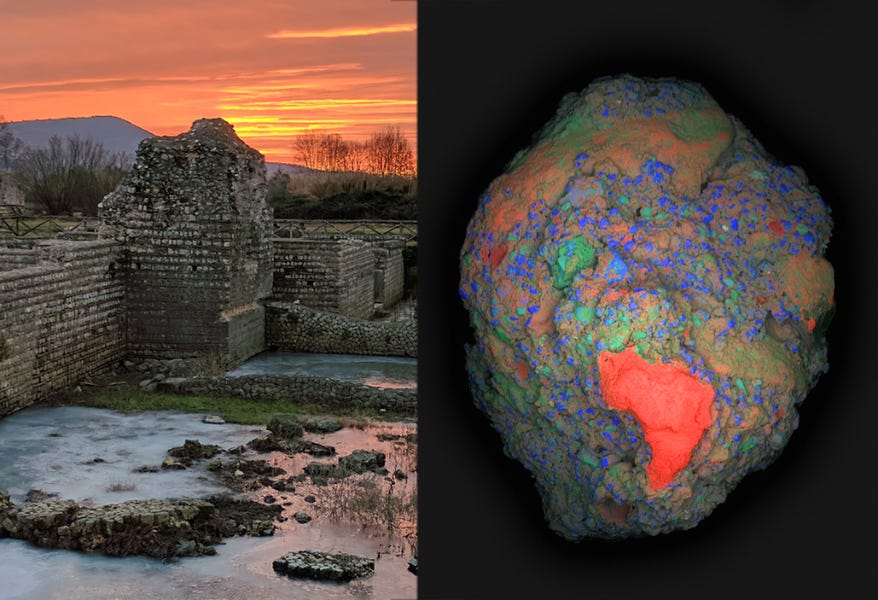Weekly Dose of Optimism #25
Not Boring Capital Fund III, Alzheimer's Accelerated Approval, Cancer Mortality Rates, Beiruti Solar, Quicklime, Direct Air Capture, Shot of Optimism
Hi friends 👋,
Happy Friday and welcome back to our 25th Weekly Dose of Optimism. After taking a few weeks off for the holidays we’re ready to kick things off with a big ole' Shot of Optimism. This year is off to a strong start.
Let’s get to it.
The Weekly Dose is brought to you by… Composer
You know Composer, I love Composer — the investing app that helps you achieve superior returns with logic and data. Since founding its algorithmic trading platform in 2020, Composer has helped over 20,000 customers trade 100s of millions of dollars. I’m one of them — my Composer portfolio is actually up since I started using it last year, which is incredible because the portfolio of individual stocks I own is … not.
Here’s what I like about using Composer:
The product combines beauty and power — it’s my favorite investing UX
Automation, rebalancing, and conditional rules mean I can take emotion out of it
I can copy smarter peoples’ Symphonies, tweak them, build my own, and backtest them all
It’s a much simpler way to build a balanced, diversified portfolio than I could on my own
(1) Announcing Not Boring Capital Fund III
Packy McCormick for Not Boring
Companies founded in this decade will shape humanity’s trajectory for the next century. Some people are pessimistic about that trajectory – AI will kill us all, the planet will burn. We are unabashedly optimistic about that trajectory, not in the sense that everything will be perfect, but in the sense that humans have agency, acquire new knowledge, and shape the future we want. Technology companies will have an important role to play in shaping it, and tremendous value to capture from the trillions of dollars shaken loose when they do.
There’s not much to add to what Packy wrote in the Fund III announcement (he’s not one who generally leaves words on the table), but if you haven’t had the chance to read it already, I encourage you to do so. On the surface, it’s a fund investment thesis. At it’s core, it’s just another manifestation of Packy’s general worldview.
The world is on a long, upward sloping path towards progress and we should be optimistic, despite the inevitable obstacles, about that trajectory.
Here’s how I’ve started to view the Not Boring Flywheel, and the Weekly Dose of Optimism’s place within it:
Not Boring Newsletter: Analyzes the innovative business strategies and companies that are shaping humanity’s trajectory over the next century
Weekly Dose of Optimism: Celebrates the achievements of individuals, teams, and organizations that are shaping that trajectory
Not Boring Capital: Invests in the companies that are shaping that trajectory
Not Boring Founders: Amplifies the founders that are shaping that trajectory
Let’s keep this flywheel spinnin’!
(2) FDA Grants Accelerated Approval for Alzheimer’s Disease Treatment
From the FDA
Leqembi was approved using the Accelerated Approval pathway, under which the FDA may approve drugs for serious conditions where there is an unmet medical need and a drug is shown to have an effect on a surrogate endpoint that is reasonably likely to predict a clinical benefit to patients. The results of a Phase 3 randomized, controlled clinical trial to confirm the drug's clinical benefit have recently been reported and the agency anticipates receiving the data soon.
We’ve written at length as to why Alzheimer’s treatments are important to us — it runs in our family, it impacts tens of millions of families world wide, and it’s generally just one of the shittier disease to experience, first or second hand. Packy’s fear of Alzheimer’s is what drove him to start writing in the first place.
The FDA recently approved Leqempi, a promising Alzheimer’s treatment, for Accelerated Approval. And while the approval was not met without criticism — look what happened with Aduhelm, it’s too expensive, it doesn’t help all Alzhiemer’s patients, more data is needed — we are generally supportive of common sense accelerated approvals on treatments that could have a meaningful impact on quality of life, especially when the alternative is “no alternative.”
(3) Risk of Dying from Cancer Continues to Drop at an Accelerated Pace
From The American Cancer Society
The 32% drop in cancer death rate between 1991 and 2019 translates to almost 3.5 million fewer cancer deaths during these years than what would have been expected if the death rate had not fallen. This success is largely because of fewer people smoking, which resulted in declines in lung and other smoking-related cancers.

Packy and I spoke to a founder on Wednesday that surprised us when he said, “There is already a cure for cancer. It’s early detection.” While there’s no silver bullet, early detection has been one of the leading drivers of declining cancer death rates over the last 30 years.
According to a new report published by the American Cancer Society, during the last 30 years there’s been a 32% decrease in cancer mortality rates which have resulted in an estimated 3.5 million fewer cancer deaths. What that means in practice is that a handful of people that you know haven’t died from cancer that would have in earlier generations. This decline is largely due to a combination of less smoking, earlier detection, and improved therapeutics.
(4) In Lebanon, Solar Power Is Booming. Why?
Kristin V. Monroe for Sapiens
Still, there is, undeniably, something brightening about Lebanon’s solar panels. As Younis’ story reveals, the panels are a double-edged sword: In financing their own solutions to economic and political breakdown, many Lebanese are becoming further burdened by debt. But by enabling people to power their households, solar panels have also helped restore some normalcy and alleviate hardship—allowing people to reclaim dignity lost during the country’s collapse.
At a macro-level, we’ve written extensively about the plummeting cost of solar (solar kWh from $0.42 in 2009 to $0.05 in 2021) due to learning curves. This is one of the more important stories in energy, and therefore in the world, of the last few years. So it’s cool to see the impact of solar at the more micro-level, as we are seeing in Lebanon. Lebanon’s economy is struggling, the currency has lost 90% of its value in three years, there is a devastating energy shortage, and, or course, political turmoil — and against this backdrop, individuals are left to power (literally) their own lives. Some have turned to generators and others, increasingly commonly, have turned towards solar.
As the writer notes, it’s tempting to view this as an optimistic story. The Beiruti people are resilient and, perhaps, even super environmentally conscious. But below the surface, the story is a bit darker — it’s a story of what happens when a state fails to provide basic utilities like electricity. If nothing else, it shows that decentralized solutions can work when the centralized one falls short. People are resilient.
(5) Riddle solved: Why was Roman concrete so durable?
David L. Chandler for MIT News
Under closer examination, these ancient samples also contain small, distinctive, millimeter-scale bright white mineral features, which have been long recognized as a ubiquitous component of Roman concretes. These white chunks, often referred to as “lime clasts,” originate from lime, another key component of the ancient concrete mix.
A team of researchers recently discovered the secret to ancient Roman structures’ durability, and that secret could be beneficial in the development of more durable, lighter-weight, and ultimately environmentally friendlier concretes today. Without getting too much into the details, what were previously thought to be little white blemishes in ancient concrete are actually the signs of a sophisticated concrete mixing process called “quickliming.” The lead researcher had been confounded that the otherwise meticulous ancient builders would allow for such blemishes, unless they held a deeper purposes — and it turns out, his suspicion was on point.
Material science will be increasingly important over the next few decades as we generate and harness more energy, explore foreign terrains, and build increasingly advanced structures. And as this story reminds us, when building for the future, it’s always wise to understand the past.
Bonus: Not Boring Founders: Nicholas Chadwick, Mission Zero Technologies
Packy sat down with Nicholas Chadwick, founder and CEO of Mission Zero Technologies. MZT is developing direct air capture (DAC) technology that will recover high-purity CO2 from the air while incurring only a fraction of the costs and energy it takes to do so today. We were first put in touch with Nick and the team by Frontier, the Advanced Market Commitment run by Stripe, Shopify, Meta and others.
P.S. — We also dropped the world premier of “Shot of Optimism” at the top of this episode. We apologize in advance that it’ll be in your head all day. s/o Yung Spielberg!
That’s all for this week. We’ll be back in your inbox 9am EST on Monday morning.
Thanks for reading,
Dan








Happy New Years boys!
Fascinating hearing about the cancer rate drop. But Siddhartha Mukherjee’s book
“The Emperor of All Maladies: A Biography of Cancer” offers a cautionary tale on creating too much optimism too soon regarding these findings.